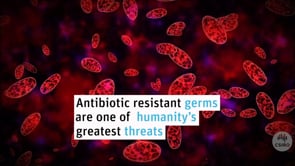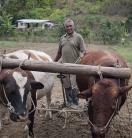Australia joins forces with Fiji to fight superbugs

Australian researchers will work with their Fijian counterparts to detect and understand the spread of superbugs with the development of a new surveillance system.
Co-funded by ACIAR and the Department of Foreign Affairs and Trade's Indo-Pacific Centre for Health Security, the new A$3million project aims to identify the emergence of superbugs and inform interventions to reduce their prevalence across the region.
Superbugs—bacteria that has become resistant to the antibiotics used to kill them—requires increasingly strong doses of with significant implications for both human and animal health.
Increased burden on healthcare systems, damaging impacts on food security, as well as detrimental effects on ecosystem services such as environmental biodiversity and water purification, are some of the estimated economic costs. These could be as high as $US1.35 trillion over the next 10 years in the Western Pacific region alone, creating an urgent global challenge.
Lead by CSIRO and in partnership with the Government of Fiji and researchers from the University of Technology Sydney, University of South Australia, University of South Pacific and Fiji National University, the project will take a One Health approach to sustainably monitor antimicrobial use across human health, animal health, and in the environment.
This project will bring together data from hospitals, farms, and the environment in Fiji to identify AMR trends and hot spots, where currently, information on AMR is not widely available.
For example, analysing wastewater from farms contaminated with pharmaceuticals at the same time as hospital pathology lab reports can provide a real-time snapshot of AMR across the nation.
It will also build local laboratory and research capabilities and diagnostic technologies to help analyse AMR biomarkers more efficiently.
CSIRO biosecurity research director Dr Paul De Barro said a holistic view of antimicrobial use and resistance was crucial for responding to future outbreaks for not only Fiji, but also Australia.
“We know prevalence of antimicrobial resistance is only going to rise globally so Australia needs to be prepared,” Dr De Barro said.
“This research has the potential to be leveraged across the Pacific region, including Australia.
“The opportunity for Australia being part of this collaborative project means we can take a proactive and coordinated approach to tackling antimicrobial resistance. This will build on the AMR surveillance work we are currently undertaking here in Australia.”
Fiji’s National Antimicrobial Resistance Committee Chairperson Dr Eric Rafai said the research will provide a positive way forward for the country to tackle remaining challenges as part of its AMR action plan.
“It has been critical for us to be proactive in this space and we are the first country in the Pacific to adopt a national action plan against antimicrobial resistance,” Dr Rafai said.
“Our action plan is helping us to deal with complex health problems and gives us an effective platform for managing pandemics, like COVID-19. In order for us to develop the right interventions for our nation, we’re excited to be collaborating with our partners in Australia to tackle this issue.”
Dr Francette Geraghty-Dusan, Associate Research Program Manager of One Health at ACIAR, explains that this research will not only benefit the Pacific, but will build Australia’s capacity also.
“When Australia’s research organisations partner with other countries on One Health activities, it’s mutual capacity building. The lessons we learn along the way can then be applied to One Heath research globally.”
This project is part of the ACIAR One Health research program partnering with Fiji, Papua New Guinea, Indonesia, Cambodia, Laos, and Vietnam, focused on addressing diseases through a multi-faceted approach encompassing human, animal and environmental health.




